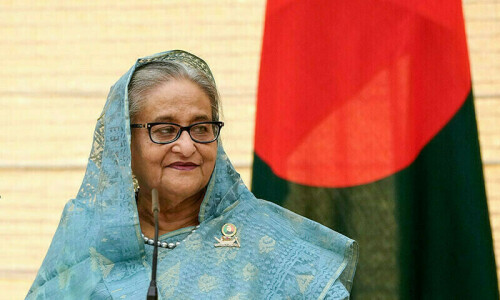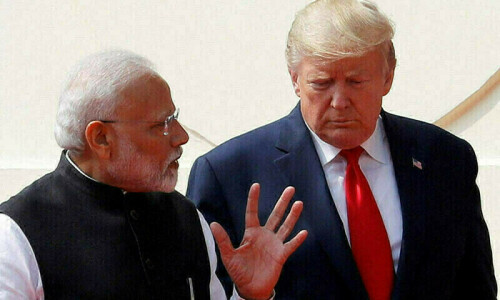COLOMBO: Sri Lanka’s government has the upper hand in a new phase of a 25-year civil war against the Tamil Tigers, but it would be foolish to write the rebels off, experts say.
After opting to take the war to the rebels and formally scrapping a six-year truce, the government banished Nordic truce monitors who were cataloguing violence and accused elements of the military of an aid worker massacre and other rights abuses.
With no monitors, and a United Nations human rights monitoring mission ruled out by a government increasingly isolated from the international community over human rights and accountability, there are no independent battlefield accounts.
Instead, the foes are locked in a parallel propaganda war and seen inflating enemy losses and playing down their own.
The military issues regular statements saying dozens of Tigers have been killed, often for the loss of few if any soldiers. They seldom offer proof or show bodies, saying they have intercepted rebel radio communications.
The Liberation Tigers of Tamil Eelam (LTTE), who want to carve out an independent state in the north and east and who seem to be increasingly targeting civilians with roadside and suicide bombings across the country, laugh off the tolls.
Since the start of 2006, a total of 6,486 rebels, 1,196 military personnel and 982 civilians have been killed, the military says, estimating there are now only around 5,000 rebel fighters still alive.
“One cannot really measure success or failure in the war purely on the strength of the statistics,” Athas said. “The death toll figures are meaningless.”
The government says the figures show they are winning.
“Certainly they reflect the forward march of the forces,” said Keheliya Rambukwella, a minister and government defence spokesman, dismissing suspicions that the military is playing down troop death tolls or even dumping bodies.
The death toll reports help to sustain an aura of confidence President Mahinda Rajapaksa’s government is projecting, seen as crucial in the battle to maintain the support of the majority ethnic Sinhalese, who dominate the south.
Rajapaksa’s government has a razor-thin parliamentary majority, and in the topsy-turvy world of Sri Lankan politics and cross-overs that leaves it vulnerable.
“(The south) bought the argument that one has to defeat terrorism, and they’re willing to do the economic sacrifice for it,” said Paikiasothy Saravanamuttu of independent think-tank the Centre for Policy Alternatives.
“But that is only sustained as long as the government will keep demonstrating that victory is both certain and imminent and that sacrifice is worth bearing,” he added.
And that means flying a flag in the de facto rebel capital, Kilinochchi, 205 miles northeast of Colombo, he said.
The stock market slid nearly 7 per cent in 2007 due mainly to the conflict, with some businesses shelving investment plans, while tourist arrivals fell 12 percent last year.
However tourists are still visiting.
Compounding matters, the government is struggling to bring down inflation, which at 17.6 per cent in January is running at near 17-year highs, while increased defence spending is putting additional pressure on its budget.
The Tigers continue to mount attacks in the south, launching a spectacular raid on a northern air base using 21 suicide fighters and a home-grown air wing of light aircraft in October.
But with improved military training and tactics, an armed forces of around 200,000-strong versus Tiger strength estimated at around 5,000-10,000, and superior fire power that includes a clutch of reconditioned fighted jets, some believe the government can utlimately defeat the Tigers militarily.
But without real political devolution for the minority Tamil community, such military gains could be wasted.
“I think it’s quite clear that at the moment the LTTE is on the back of a very long run of significant military reversals,” said a foreign diplomat on condition of anonymity. “The difference really is air power.”
“The army has got the numerical advantage for an attritional campaign ... I really don’t see a situation where we suddenly see the Sri Lankan army necessarily defeated. But you could foresee a situation where it becomes bogged down.”—Reuters
















































Dear visitor, the comments section is undergoing an overhaul and will return soon.